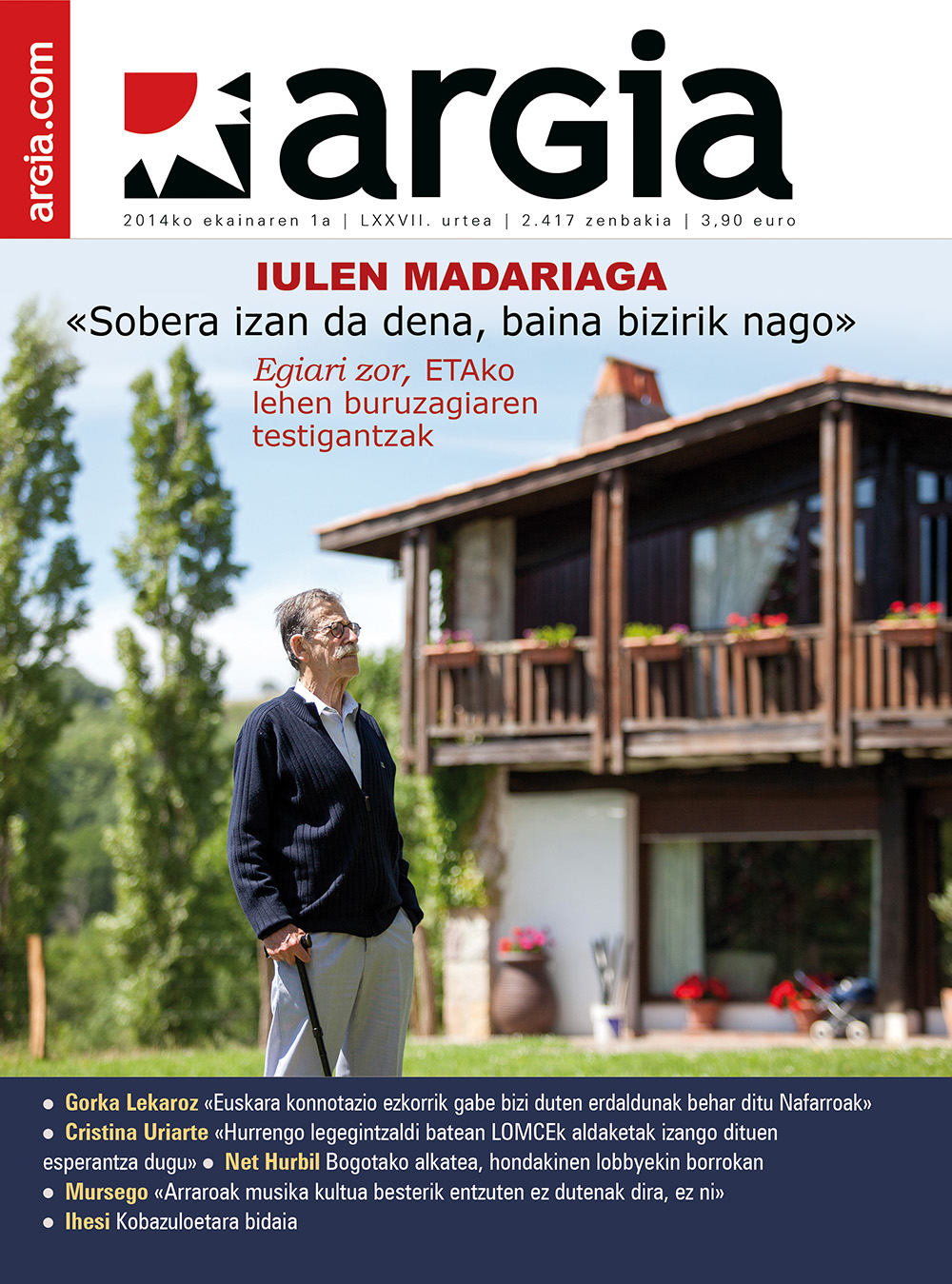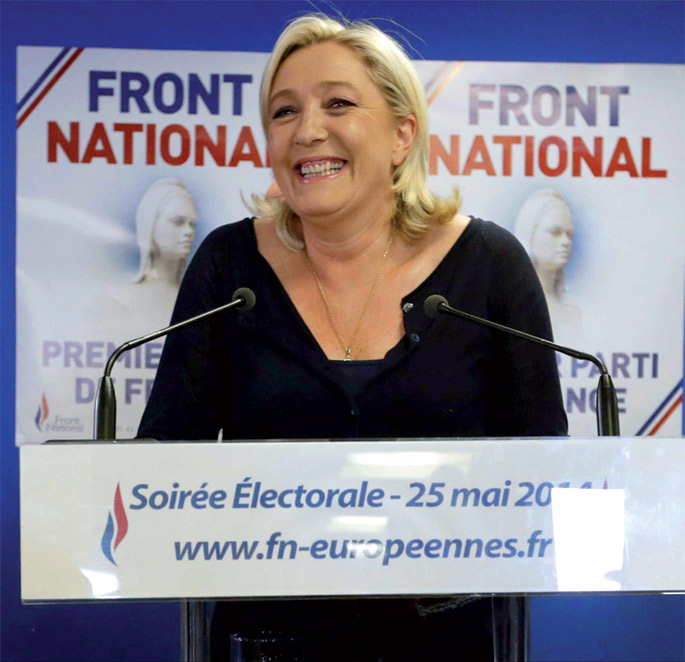An alternative government is possible without the PSN
- The result of PNV and EH Bildu has strengthened the Abertzale block, and it is already a trend. In addition to competing for hegemony, they will have to seriously consider a stronger collaboration from the point of view of popular construction. In Navarra, however, these results have demonstrated that an alternative government is possible without the PSN as an alternative. Bad, but possible. It’s not the contradiction, but instead of deepening the right to decide, EH Bildu should focus in the coming years on the alliance with leftist forces to build an alternative to UPN in the old kingdom.

As planned, the EU elections are not attractive and more than half of the Basques (around 55%) do not participate in them. However, in Hego Euskal Herria, participation has increased by two or three points compared to the 2009 results. This means, therefore, being attentive to the extrapolations made in the run-up to the forthcoming elections, as an increase in the participation of 20-30% can radically change any outcome.
However, we cannot deny that the European elections also mark very clear trends, especially on this occasion: In the post-ETA political map that gradually began to consolidate as of 2011, the Abertzale bloc formed by PNV and EH Bildu is emphasizing its hegemony in Hego Euskal Herria, and the decline of pp and PSOE is constant. In this case, the most noteworthy would be the result of the PSOE, which in the CAV and Navarra lost, on average, more than half of their votes compared to 2009 (59.18% versus 28.28%). Pp loses a third (26.8% to 17.6%). And in general, the results of the lowest ones, especially those on the left, such as Ezker Anitza (62,000 votes) and Podemos (72,000 votes), cannot be forgotten in these elections. Between the two they obtained more than 135,000 votes in Hego Euskal Herria. UPD has also risen significantly, doubling its votes (30,000 votes). With these results, however, the most remarkable thing is that Podemos would enter the Basque Parliament and UPD would stay out of the chamber. Regarding these three aspects, the tendencies of Spain are maintained, which point to a possible outcome of the Spanish bipartisanship. But surely that requires elections in which citizens feel closer to each other to see if those tendencies of smaller parties are speeded up. This will be seen in the 2015 municipal elections in Spain.
CAPV: The PNV, ahead of EH Bildu
Until now, this would be a global analysis of the data of Hego Euskal Herria. In Ipar Euskal Herria UMP predominates, the second is the FN (with PS and Modem nearby) and the PNV between the abertzales, but it should be noted that the traditional Abertzale left has not been voted. Making a more detailed reading of the current political and administrative reality, the PNV is the main party of the CAV and EH Bildu is following closely, with four points less (27.45%/23.35%). Regarding the distribution of the main traditional blocks, the PNV-EH Bildu block (50.8%) doubles that of the PP-PSE block (23.99%). Territorial accounts are clear: In Bizkaia, the hegemony of the PNV is total, and as in the last elections, EH Bildu is clearly established as a second force. In Gipuzkoa, EH Bildu has been the most voted force and the PNV the second force; following the tendencies of the autonomists of 2012, the Jeltzales had hopes of getting closer to EH Bildu, but they have remained at almost seven points. And the biggest surprise has occurred in Álava, where EH Bildu is the first force and the PNV at two points.
Defeat of the PSOE
In these elections, however, rather than triumphs, the failures, especially those of the PSE, must be highlighted. The Patxi Lopez party has achieved the worst results in its history and lost half the votes (202,000 to 104,000). The loss of pp has also been enormous, has lost a third in the CAV (from 107,000 to 77,000), and has also had a significant symbolic loss in the seats, as Carlos Iturgaiz has not managed to regain his seat. These days we will be listening to the explanations of the different parties' addresses, but the statements that have already been made by some leaders seem not to be going in the best direction. Idoia Mendia said on Monday that her party’s error would not be in the content, but in the forms, because the parties on her left have not presented novelties in the content, but in the forms. Besides the fact that what they have in common with Ezker Anitza-IU and Podemos is not true, Mendia wants to forget the PSOE’s attitude to the crisis in Madrid, and that has not been forgotten by the citizens, nor by its voters. How can we understand or believe that it is the head of a territory that has lost most of the votes throughout the State that lifts the party of its defeat? Iturgaiz's explanation is also that made by the losers of the major parties, they always win: yes he acknowledged the loss of PP in the CAV, and also his own, but in general he remembered that in Spain PP remains the first force and that it must be given importance.
Navarre to red live
In these elections in Navarre it was at stake that the opposition forces could form a government without the PSN, and the results between the blocs have been very close to the results. Between pp, PSN and UPD they achieved 44% of the votes, while between EH Bildu, Podemos, I-E and PNV they obtained 40.7% of the votes. Of course, here are the two political forces that have not come forward, because in one block and another there is a lack of a large part of the UPN voters and in the other there is a need to add the votes of Geroa Bai. As for the latter, if something is clear, it is the strength of the PNV within that coalition (5,400 votes), as in the last general elections in 2011 Geroa Bai won 42,000 votes. Abstention is there and the results of the two elections cannot be fully compared, but the data are very significant.
EH Bildu maintains its challenge of being the second force in Navarre. You might think, but basically you had to see how far the loss of the SNP would go. And yes, with these results it could be stated that the party led by Roberto Jiménez has paid very expensive once again its policy of keeping UPN in government. Abstention is there, OK, but the course is clear, so the PSN is on the line of becoming a very secondary party. On the other hand, it is very possible that some of the votes of Geroa Bai have gone to Podemos to support the investiture. In any case, the result obtained by left-wing parties, with the exception of the PSN, is remarkable: EH Bildu, Podemos and I-E have won over 83,000 votes (38.9%).
It takes a year for municipal and foreign elections and competition will be very tough. The key, probably again, will be in the hands of the PSN. With the results that have been produced in Spain and the Catalan process in front of each other, one cannot rule out a hypothesis such as the one that is recently flying, that is, a coalition government PP-PSOE in Madrid, and obviously that would have a great impact also in Navarra. As for history, it would be very likely that the PSN would back support UPN, but that path is also increasingly clear to where it leads to the PSN. Moreover, what was once a chimera is already a long way away, but it may be possible, that is, to form an alternative government without the SNP. One year can go a long way, on the one hand or on the other, and competition will be huge, at least that is announced.
Frantziako Estatuan 8 dira hauteskunde barrutiak. Akitania, Languedoc-Roussillon eta Midi-Pyrénées eskualdeek 4. osatzen dute. Herritarrek 10 europarlamentari hautatu dituzte, aulkiak honela banatuz: FNk 3 irabazi ditu (bozen %24,71). UMPk 2 (%18,51). PS-PRGk 2 (%15,73). EELVk 1 (%11,48). UDI-MoDemek 1 (%8,60). Front de Gauchek 1 (%8,57). Abstentzioa estatuko antzekoa izan da: %52,51.
Politikari ezagun hauek izanen dira Bruselan: Louis Alliot eskuin muturrekoa, Michele Alliot-Marie eskuindarra, Virgine Rozière sozialista, José Bové ezkerreko ekologista, Rober Rochefort zentrista eta Jean-Luc Melenchon ezkertiarra.
Ipar Euskal Herriko emaitza orokorra ezagutu ezean, hona bera hartzen duen departamenduko (Pirinio Atlantikoak) datu azpimarragarri batzuk: Alliot-Marie izan da bozkatuena, 42.000 boz jaso du, José Bovék berriz 26.000 inguru.
Baiona –Ipar Euskal Herriko hiriburua– hartu dugu tokiko euskal herritarren bozen lagin: UMPko Alliot-Mariek %22 jaso ditu. FNko Alliotek %14,79. PSko Rozièrek %12,86. EELVko Bovék %12,55 eta Rochefort zentristak %11,62. EH Bai (ezker abertzalea) ez da aurkeztu, ez inoren aldeko boz eskatu ere. EAJko Jean Telletxeak bozen %7,48 jaso du Baionan.
Edonola ere den, FNk eman du Iparraldean ere jauzi izugarri, hala Akitanian nola 8. barrutian. Frantziako Asanblea Nazionalean ordezkaritzarik ez izatetik Europako Parlamentuan frantziar aulki gehien duen alderdia izatera pasa da. Marine Le Penen Fronte Nazionalak lurrikara politikoa sorrarazi du estatu osoan, Pirinioak hartzen dituzten hiru lurraldeetan barne.
Most Moved Holder: The PP has won the elections, especially because it has eaten Citizens in its entirety, and the PSOE remains roughly equal, keeping three out of ten total voters. Therefore, the PSOE has maintained the battle and a half badly seen what has happened in Europe,... [+]
Europarako Liberal eta Demokraten Aliantzak (ALDE) UPyD alderdia onartu du, talde berean dauden EAJ eta CDCren kontrako botoekin. Trukean, autogobernuari buruzko azpitaldea sortzea onartu du ALDEk.
Europako hauteskundeen ostean Syriza, Greziako ezkerreko koalizioa, herrialdeko lehen indar politikoa bihurtu da. Kostas Isychosek, alderdiaren kanpo politikaren arduradunak, “politika alternatiboentzako itxaropen boto” gisa deskribatu ditu emaitzak, Marta... [+]
Eduardo Muriel kazetariak Podemosek Europako hauteskundeetan izan duen arrakasta aztertu du La Marea hedabidean.
Alderdi ultraeskuindar eta populistak indar handiz sartu dira euroganberan.Frantzian Fronte Nazionalak panorama politikoa astindu du, eta Espainian bipartidismoak galera itzela izan du.
Hauteskunde europarrek emaitza esanguratsuak utzi dituzte Frantzian. Iritzi-azterketek iragartzen zuten bezala, eskuin-muturreko Frente Nazionala (FN) lehen tokian iritsi da bozen %25arekin. Horri esker, 23-25 eserlekuko eskuratu ditu, europar legebiltzarrean indarrarekin... [+]
“Igandeko emaitzak ezin dira balizko foru hauteskundeetara ekarri”, gaztigatu zigun Yolanda Barcinak duela hiru egun, maiatzaren 23an. Gauza bera erran du Sergio Sayas UPNko komunikazio idazkariak: emaitzak ez dira ekartzekoak, “Nafarroako alderdi nagusia... [+]
“Oraingoan, ezberdina da” zioen, fede baino borondate gehiagorekin agian, Europako Parlamentuaren web orri ofizialak aurtengo hauteskundeen aurkezpenean. Lisboako Itunaren ebazpenak aintzakotzat hartuz egindako lehendabiziko bozketak zirela azpimarratzera zetorren... [+]
Ezkerrak egin du gora Erkideagoan eta ezkerrak egin du gora Nafarroan. Espainiako Estatuan ere ezkerrak gora egin du (IU). Eta Katalunian berriz, Esquerrak irabazi du. Kataluniak Esquerrari eskerrak Europako bidean Estatu izateko bidean beste urrats bat gehiago eman du.
Horrela deitzen du Luis Moreno ikertzaileak lehengo urtean plazaratutako bere liburua. Eta horixe da niri hauteskunde gauaren ostean geratu zaidan sentsazioa.
Atzoko hauteskundeek utzitako titular nagusia Europa mailan alderdi euroeszeptikoek izandako igoera da ezbairik gabe. Ultraeskuinari dagokionean, arreta gehien bereganatu duen kasua frantziar estatuko Front Nationalen kasua izan da. Marine Le Penen alderdi ultraeskuindarrak... [+]
Ordezkari bana bidaliko dute Bruselara EAJk eta EH Bilduk datozen bost urteetarako. Euskal Herrian EAJk atera du boto gehien, zazpi lurraldeetan aurkeztuta: 220.885. EH Bildu Hegoaldean bakarrik aurkeztu da, eta bertan lehen indarra izan da. EAEn EAJk irabazi du, Nafarroan PPk... [+]
Info Zazpik idatzitako txio batean zioen Antonio Alvarez Solis kazetariak: “Estaturik gabeko nazioentzat Europako munstroaren aurrean beharrezkoa da ahotsa izatea”. Ez dut ukatuko garrantzitsua ez denik, baina hortik zorionak esateraino…
Ipar Euskal Herriko emaitza orokorra ezagutu ezean, hona bera hartzen duen departamenduko (Pirinio atlantikoak) datu azpimarragarri batzuk.
















